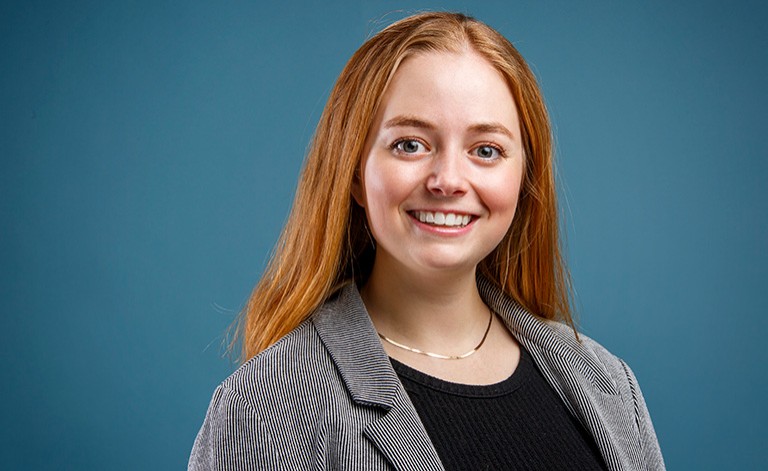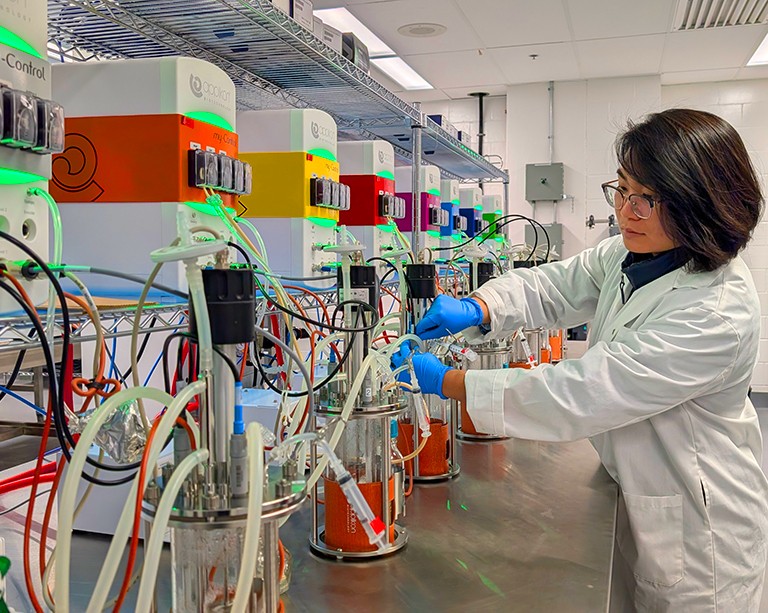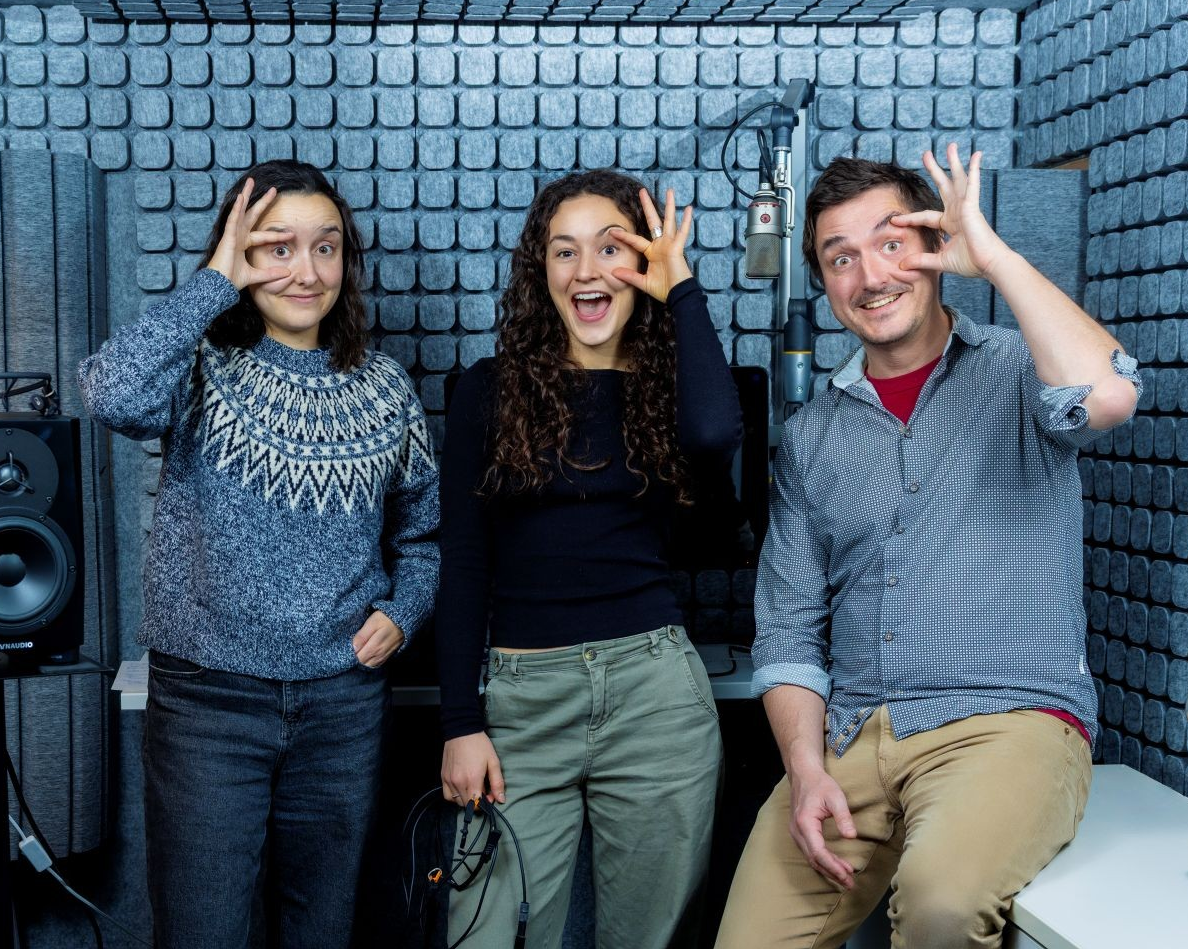One Concordia student is taking undergraduate mentorship to the next level
 Emily Andrews: “Concordia is a big institution, but there is potential to create a community.”
Emily Andrews: “Concordia is a big institution, but there is potential to create a community.”
For students just starting out at university, finding inspiring mentors can be a challenge.
But what if the solution was right under your nose?
Emily Andrews is a second-year undergraduate student in communication studies in the Faculty of Arts and Science. She turned a classroom assignment into a pilot project that brings Concordia staff and undergraduate students together, via a “mutual mentorship” model.
“I learned that it is possible for an undergraduate student, even in their first year, to build connections and really make their time here what they want it to be,” says Andrews of her experience.
“Concordia is a big institution, but there is potential to create a community and to be an agent of change within it.”
Getting inspired
Andrews says the inspiration for the project began when she signed up for the Leadership, Change and Social Innovation (AHSC 498) class in fall 2018.
The course, run by Eva Pomeroy, Concordia’s social innovator in residence, is offered through the Department of Applied Human Sciences. It’s part of the u.lab Social Innovation Hub, housed in the Faculty of Arts and Science. The course uses an integrated learning approach to bring together students and community members.
Its goal? To absorb ideas, reflect on them and ultimately work with other participants to develop an idea that can be prototyped.
“It’s a safe space that allows for students and community members to engage in social innovation in a supportive and emergent environment,” Andrews explains.
In the early days of u.lab, she participated in an exercise that teamed up students and community members. The community member she wound up speaking to was Andrew Woodall, Concordia’s dean of students.
“I had no idea who he was!” she says.
“I asked him if there was any way a student could follow him around for a day and learn from people like him, and he said there wasn’t — but that it was a good idea.”
From prototype to pilot project
Andrews developed her prototype throughout the remainder of the course, designing a test run with help from the Dean of Students Office
Working with fellow students Anne-Marie Mulumba and Maria Stawnichy, under Pomeroy’s supervision, Andrews created the prototype — now dubbed “Connect Concordia”. The three students were then paired with three Concordia staff members.
In winter 2019, the team moved to the next phase of the project, under u.lab 2x, an independent, for-credit course designed to further promising prototypes developed in the fall course.
“U.lab 2x gave us the resources and platform to continue building the project. We researched and explored the need for mutual mentorship within Concordia,” Andrews says.
This past semester, in the fall of 2019, the pilot project expanded, with support from the Sustainability Action Fund and the Special Project Fund, under the supervision of Andrea Taylor from the Student Success Centre.
This time, 11 students were paired with Concordia Library staff, staff from the Dean of Students Office and the Student Success Centre.
Feedback was excellent.
“I feel like Concordia has so many resources, but students aren’t aware of them. Talking to staff allows you to get their perspective on how things work and the connection you create with them can lead to great things,” said one student participant.
“It was interesting to hear about the student's perception of and experience with staff and admin at the university,” said a staff member. “Hearing that many of their peers don't feel that we are accessible will encourage me to do more to let students know that our doors are open. Myself, along with my Dean of Students Office colleagues, are there to support them through the services and programs we offer.”
Andrews adds that the demand for mentorship is so high that they now have a waitlist.
Woodall and his team have remained supportive throughout the process.
“For me, Connect Concordia fills a hole in our offerings to students at Concordia,” Woodall says.
“Generally, students have no idea what people do who work as staff and in administration at the university. Our people have such varied stories and backgrounds, and are doing such interesting work. But they are off the radar.
“Connect Concordia brings students and staff together to learn about one another. Students get an idea of possible future careers and staff members get the opportunity to talk to a student in a unique way that opens up dialogue.”
What’s next?
Connect Concordia recently sparked a partnership with the Faculty of Arts and Science and is launching the second phase of the pilot this semester.
“We are continuing to ground Connect Concordia within the university and are aiming to solidify our mission statement, goals and vision,” Andrews notes.
She remains grateful for the support her project has received along the way and the environment u.lab provided to encourage its growth.
“U.lab was the scaffolding that allowed for thorough and thoughtful change to take place. In this way, it supported me to build the program with passion, care and a solid foundation, instead of it being a one-hit wonder.”
Learn more about Concordia's u.lab Social Innovation Hub.




